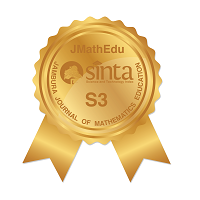Digital Natives Preferences in How to Learn Mathematics: A Qualitative Study of Preservice Mathematics Teachers
Abstract
Keywords
Full Text:
PDFReferences
Yong, S. and Gates P, "Born digital: Are they really digital natives"International Journal of e-Education, e-Business, e-Management and e-Learning, vol. 4, no. 2, pp. 102-105, 2014.
Kelly, F. S., Mccain, T., and Jukes, I., Teaching the digital generation: No more cookie-cutter high schools, Corwin Press, 2008.
Prensky, M., "Digital natives, digital immigrants," On The Horizon, vol. 9, no. 5. pp. 3-6, 2001.
Hamadneh, I. M. and Masaeed, A.A., "Math teachers attitudes towards photo math application in solving mathematical problem using mobile camera," Educational Research and Reviews, vol. 10, no.14, pp. 1930-1936, 2015.
Harefa, D., et al., "Penerapan Model Pembelajaran Cooperative Script untuk Meningkatkan Hasil Belajar Matematika," JKPM (Jurnal Kajian Pendidikan Matematika), vol. 6, no. 1, pp. 13-26, 2020.
Hignasari, L. V. and Supriadi, M., "Pengembangan e-learning dengan metode self assessment untuk meningkatkan hasil belajar matematika mahasiswa universitas Mahendradatta," Jurnal Kependidikan: Jurnal Hasil Penelitian Dan Kajian Kepustakaan Di Bidang Pendidikan, Pengajaran Dan Pembelajaran, vol. 6., no. 2., pp. 206-219, 2020.
Yusuf, M., "Peningkatkan Hasil Belajar Matematika Siswa melalui Lembar Kerja Siswa (LKS) Interaktif Berbasis Komputer di SMA Muhammadiyah 1 Palembang," Jurnal Pendidikan Matematika, vol. 4., no. 2, pp. 34-44, 2010.
Rahayu, R., et al., "Implementasi Kurikulum Merdeka Belajar di Sekolah Penggerak," Jurnal Basicedu, vol. 6, no. 4, pp. 6313-6319, 2022.
Kivunja, C., "Theoretical perspectives of how digital natives learn," International Journal of Higher Education, vol. 3, no.1, pp. 94-109, 2014.
Thompson, P., "How digital native learners describe themselves," Education and Information Technologies, vol. 20, pp. 467-484, 2015.
Aziz, A. et al., "Preferred Learning Styles for Digital Native and Digital Immigrant Visitors in the Malaysian Music Museum," Asian Journal of University Education, vol. 16, no. 3, pp. 234-246, 2020.
Siregar, N. U., et al., "Penerapan Aplikasi Geogebra pada Pembelajaran Matematika," Journal on Education, vol. 5, no. 3, pp. 8151-8162, 2023.
Murdiyanto, T. and Rohimah, S. R., "Pengembangan Media Pembelajaran Interaktif Berupa Aplikasi Komik Matematika dengan Pendekatan Kontekstual pada Materi Bentuk Aljabar Kelas VII SMP," Jurnal Riset Pembelajaran Matematika Sekolah, vol. 5, no. 2, pp.45-52, 2021.
Miles, M. B. and Huberman, A., Qualitative data analysis: An expanded sourcebook, Sage, 1994.
Moleong, L. J., Metodologi penelitian kualitatif, Remaja Rosdakarya, 2010.
Yudela, S., Putra, A., and Laswadi, L., "Pengembangan media pembelajaran matematika berbasis Youtube pada materi perbandingan trigonometri," Imajiner: Jurnal Matematika dan Pendidikan Matematika, 2020, vo. 2, no.6, pp. 526-539, 2020.
Isnaini, J. F. and Azhar, E., "Mathematics learning independence: The relationship of youtube as a media for mathematics learning," Desimal: Jurnal Matematika, vol.4, no.2, pp. 177-184, 2021.
Stole, H. "Why digital natives need books: The myth of the digital native",First Monday, 2018.
Igcasama, R.M, Ramirez, D. T., and Slanap, N. P., "Evaluation of photo math in teaching elementary algebra," Journal of Education Research and Evaluation, vol. 4, no. 4, pp. 408-413, 2020.
Yolandasari, T., Ubaidah, S., and Zulyanti, M. "Pengaruh penggunaan aplikasi photomath terhadap pemahaman konsep matematis siswa di sekolah menegah kejuruan negeri 1 kota jambi," UIN Sulthan Thaha Saifuddin Jambi, 2022.
DOI: https://doi.org/10.34312/jmathedu.v4i1.19287
Refbacks
- There are currently no refbacks.
Copyright (c) 2023 Jambura Journal of Mathematics Education

This work is licensed under a Creative Commons Attribution-NonCommercial 4.0 International License.
Jambura Journal of Mathematics Education has been indexed by:
EDITORIAL OFFICE OF JAMBURA JOURNAL OF MATHEMATICS EDUCATION |
 | Department of Mathematics, Universitas Negeri Gorontalo Jl. Prof. Dr. Ing. B. J. Habibie, Moutong, Tilongkabila, Kabupaten Bone Bolango, Gorontalo 96554, Indonesia |
 | Email: [email protected] |
 | +6285255745923 (Call/SMS/WA) |
 | Jambura Journal of Mathematics Education (JMathEdu | eISSN: 2721-7477) by Department of Mathematics Universitas Negeri Gorontalo is licensed under a Creative Commons Attribution-NonCommercial 4.0 International License. Powered by Public Knowledge Project OJS. |



















